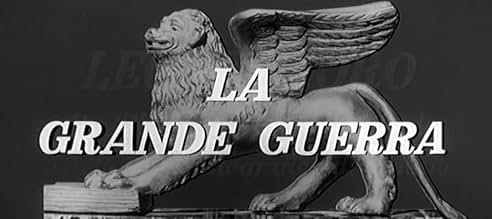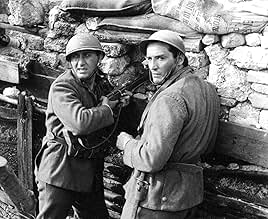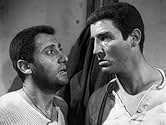NOTE IMDb
8,1/10
4,8 k
MA NOTE
Italie, 1916. Dans un régiment italien, les soldats Oreste et Giovanni sont deux lâches, dont l'amitié repose avant tout sur la quête de la survie. Mais soudain, ils doivent devenir un exemp... Tout lireItalie, 1916. Dans un régiment italien, les soldats Oreste et Giovanni sont deux lâches, dont l'amitié repose avant tout sur la quête de la survie. Mais soudain, ils doivent devenir un exemple d'héroïsme.Italie, 1916. Dans un régiment italien, les soldats Oreste et Giovanni sont deux lâches, dont l'amitié repose avant tout sur la quête de la survie. Mais soudain, ils doivent devenir un exemple d'héroïsme.
- Nommé pour 1 Oscar
- 6 victoires et 9 nominations au total
Histoire
Le saviez-vous
- AnecdotesDino De Laurentiis asked to eliminate a scene showing the arrival in the village, which serves as the center of the rear, of a number of whores. These women, with Constantina, would arrive in a military truck.
- ConnexionsEdited into Lo schermo a tre punte (1995)
Commentaire à la une
When I attended the 61st Venice Film Festival in September 2004, I saw Italian veteran film-maker Mario Monicelli several times taking a stroll by himself but, given his reputation for cantankerousness and irascibility, I thought better not to bother him; you can imagine how guilty I felt when the 95-year old frail director committed suicide by jumping out of a Roman hospital window in November 2010! Monicelli, who does not get a single mention in the "Wonders In The Dark" 3000-strong list(!), belongs with other notable Italian film directors like Pietro Germi, Elio Petri, Dino Risi, and Ettore Scola whose work had long been unjustly overshadowed by the big five, namely Antonioni, De Sica, Fellini, Rossellini and Visconti.
Best-known for his classic, star-studded caper spoof BIG DEAL ON MADONNA STREET aka PERSONS UNKNOWN (1958) – a Best Foreign Language Film Oscar contender that is still my favourite among his films and, possibly, my favourite comedy not in the English language, period! – but THE GREAT WAR (that was equally recognized by the Academy) is probably his masterpiece. Winner of the Golden Lion at the Venice Film Festival – tied with Roberto Rossellini's WWII drama IL GENERALE DELLA ROVERE starring Vittorio De Sica both here – over such superior titles as Otto Preminger's ANATOMY OF A MURDER, Kon Ichikawa's CONFLAGRATION and Ingmar Bergman's THE MAGICIAN (both 1958) – and at the David di Donatello awards, Italy's own equivalent of the Oscar, it is still underrated enough to have been given a baffling ** rating by "Leonard Maltin's Film Guide" – where, incidentally, its running time is given as 118 minutes, rather than the full 137 minutes – and the non-English-friendly Italian 2-Disc Set (which, after missing out on it a couple of times on TV over the years, is how I eventually watched it on the centenary of WWI, no less albeit jettisoning the supplements altogether due to time constraints) is still its only home video release worldwide. The film's constant veering between drama and comedy requires some initial adjustment from the viewer but it eventually reaches an exquisite seamlessness. Leading man Vittorio Gassman had been renowned for drama up to his revelation as a comic actor in the aforementioned BIG DEAL ON MADONNA STREET; conversely, his sparring partner here Alberto Sordi was popular for his own comedy vehicles prior to this; indeed, Sordi would again go to war in two notable subsequent films: Luigi Comencini's similarly bittersweet EVERYBODY GO HOME! (1960) and the more typically comic THE BEST OF ENEMIES (1961; co-starring David Niven). THE GREAT WAR is an impressive Dino De Laurentiis production, notable for distinguished cinematographer Giuseppe Rotunno's sinewy tracking shots along the trenches and Mario Garbuglia's award-winning expansive sets. The film also offers a showy role for De Laurentiis's actress wife Silvana Mangano as the proverbial whore with a heart of gold who possibly bears Gassman's child; interestingly, this is just one of several Gassman-Mangano teamings that included the star-making BITTER RICE (1949) and the epics TEMPEST (1958) and BARABBAS (1961). To portray the colourful supporting characters that make up the irrepressible duo's comrades-in-arms, an excellent cast of familiar character actors was dutifully enrolled: Bernard Blier, Romolo Valli, Folco Lulli, Livio Lorenzon, Tiberio Murgia (returning from BIG DEAL ON MADONNA STREET), Ferruccio Amendola and Gerard Herter.
Considering its significant length, it is understandable that the film follows an episodic structure but is decidedly replete with memorable vignettes: new enlistee Gassman bribing 'veteran' Sordi to avoid joining the Army in the opening scene; Gassman and Murgia's punishment for waking up late in the barracks is to have their hair completely shaved off; Gassman and Sordi asking their chaplain the way to the local brothel and he points them to Mangano's modest but highly popular dwelling; Amendola being constantly hit by the barracks' door whenever it is opened to herald a newly-arrived army bigwig on a morale-boosting tour of the trenches; cultured Valli being pestered by an illiterate private to write love letters to his beloved and read his mail and eventually having to lie to him when the local priest replies that she has married a rich old man; a messenger is killed when delivering a note from HQ that only wished a Happy Christmas to the troops (which causes the much-loved and usually well-behaved Lulli to throw a cup of brandy in his overzealous young superior' face); Murgia is constantly waxing about his love for famous actress Francesca Bertini but, when he does actually receive word from her, he tears up the letter after yet another casualty-ridden assault on their trenches; Gassman and Sordi giving their money, collected for an intended visit to a whorehouse, to Lulli's as-yet-unaware widow whom they chance to meet at the train station – subsequently joining a band of soldiers partying there amongst themselves with a minimum of girls to go around; Gassman and Sordi are continually volunteering for missions to shirk trench duties and often save their lives in the process: this stretch of good luck catches up with them at the end when the remote outpost they have ventured to is unknowingly abandoned by their army and they find it occupied by the Austrian enemy when they wake up the following morning; this leads to their heroic death when they refuse to divulge attack plans to Herter, followed by the film's sublimely ironic closing sequence where their long-suffering sergeant Lorenzon complains that these two ne'er-do-wells have once again managed to have it the easy way, cutting to an image of their lifeless bodies, and back again!
Best-known for his classic, star-studded caper spoof BIG DEAL ON MADONNA STREET aka PERSONS UNKNOWN (1958) – a Best Foreign Language Film Oscar contender that is still my favourite among his films and, possibly, my favourite comedy not in the English language, period! – but THE GREAT WAR (that was equally recognized by the Academy) is probably his masterpiece. Winner of the Golden Lion at the Venice Film Festival – tied with Roberto Rossellini's WWII drama IL GENERALE DELLA ROVERE starring Vittorio De Sica both here – over such superior titles as Otto Preminger's ANATOMY OF A MURDER, Kon Ichikawa's CONFLAGRATION and Ingmar Bergman's THE MAGICIAN (both 1958) – and at the David di Donatello awards, Italy's own equivalent of the Oscar, it is still underrated enough to have been given a baffling ** rating by "Leonard Maltin's Film Guide" – where, incidentally, its running time is given as 118 minutes, rather than the full 137 minutes – and the non-English-friendly Italian 2-Disc Set (which, after missing out on it a couple of times on TV over the years, is how I eventually watched it on the centenary of WWI, no less albeit jettisoning the supplements altogether due to time constraints) is still its only home video release worldwide. The film's constant veering between drama and comedy requires some initial adjustment from the viewer but it eventually reaches an exquisite seamlessness. Leading man Vittorio Gassman had been renowned for drama up to his revelation as a comic actor in the aforementioned BIG DEAL ON MADONNA STREET; conversely, his sparring partner here Alberto Sordi was popular for his own comedy vehicles prior to this; indeed, Sordi would again go to war in two notable subsequent films: Luigi Comencini's similarly bittersweet EVERYBODY GO HOME! (1960) and the more typically comic THE BEST OF ENEMIES (1961; co-starring David Niven). THE GREAT WAR is an impressive Dino De Laurentiis production, notable for distinguished cinematographer Giuseppe Rotunno's sinewy tracking shots along the trenches and Mario Garbuglia's award-winning expansive sets. The film also offers a showy role for De Laurentiis's actress wife Silvana Mangano as the proverbial whore with a heart of gold who possibly bears Gassman's child; interestingly, this is just one of several Gassman-Mangano teamings that included the star-making BITTER RICE (1949) and the epics TEMPEST (1958) and BARABBAS (1961). To portray the colourful supporting characters that make up the irrepressible duo's comrades-in-arms, an excellent cast of familiar character actors was dutifully enrolled: Bernard Blier, Romolo Valli, Folco Lulli, Livio Lorenzon, Tiberio Murgia (returning from BIG DEAL ON MADONNA STREET), Ferruccio Amendola and Gerard Herter.
Considering its significant length, it is understandable that the film follows an episodic structure but is decidedly replete with memorable vignettes: new enlistee Gassman bribing 'veteran' Sordi to avoid joining the Army in the opening scene; Gassman and Murgia's punishment for waking up late in the barracks is to have their hair completely shaved off; Gassman and Sordi asking their chaplain the way to the local brothel and he points them to Mangano's modest but highly popular dwelling; Amendola being constantly hit by the barracks' door whenever it is opened to herald a newly-arrived army bigwig on a morale-boosting tour of the trenches; cultured Valli being pestered by an illiterate private to write love letters to his beloved and read his mail and eventually having to lie to him when the local priest replies that she has married a rich old man; a messenger is killed when delivering a note from HQ that only wished a Happy Christmas to the troops (which causes the much-loved and usually well-behaved Lulli to throw a cup of brandy in his overzealous young superior' face); Murgia is constantly waxing about his love for famous actress Francesca Bertini but, when he does actually receive word from her, he tears up the letter after yet another casualty-ridden assault on their trenches; Gassman and Sordi giving their money, collected for an intended visit to a whorehouse, to Lulli's as-yet-unaware widow whom they chance to meet at the train station – subsequently joining a band of soldiers partying there amongst themselves with a minimum of girls to go around; Gassman and Sordi are continually volunteering for missions to shirk trench duties and often save their lives in the process: this stretch of good luck catches up with them at the end when the remote outpost they have ventured to is unknowingly abandoned by their army and they find it occupied by the Austrian enemy when they wake up the following morning; this leads to their heroic death when they refuse to divulge attack plans to Herter, followed by the film's sublimely ironic closing sequence where their long-suffering sergeant Lorenzon complains that these two ne'er-do-wells have once again managed to have it the easy way, cutting to an image of their lifeless bodies, and back again!
- Bunuel1976
- 24 févr. 2014
- Permalien
Meilleurs choix
Connectez-vous pour évaluer et suivre la liste de favoris afin de recevoir des recommandations personnalisées
- How long is The Great War?Alimenté par Alexa
Détails
- Durée2 heures 17 minutes
- Couleur
- Mixage
- Rapport de forme
- 2.35 : 1
Contribuer à cette page
Suggérer une modification ou ajouter du contenu manquant

Lacune principale
By what name was La grande guerre (1959) officially released in Canada in English?
Répondre



























